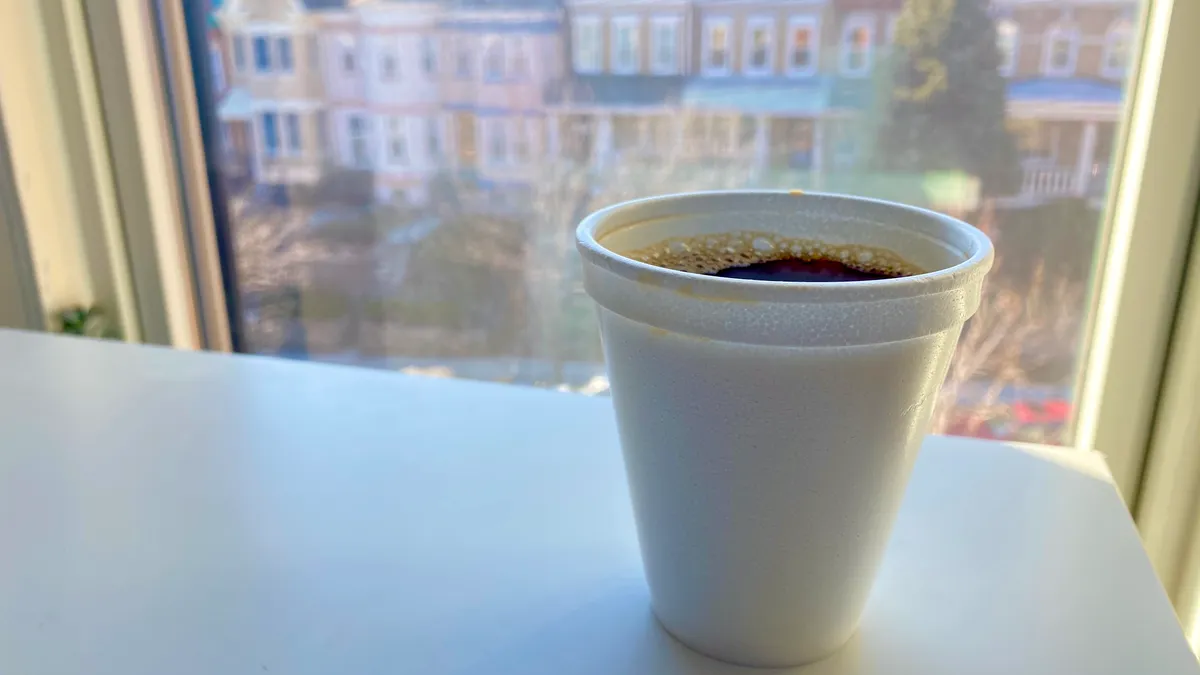UPDATE: March 31, 2021: Virginia Gov. Ralph Northam has approved SB1164, the bill amending the state's Solid Waste Management Act to classify advanced recycling as a manufacturing process rather than solid waste management. The bill received broad support in both the state Senate, passing with a vote of 34-4, and the House, passing 90-8. It is the tenth state to pass such legislation.
Northam also recently approved HB1902, the bill banning foam foodservice containers, on March 23. The ban will go into effect July 1, 2023, for certain chain restaurants and July 1, 2025, for all other covered food vendors.
Dive Brief:
- A Virginia bill classifying advanced recycling as a manufacturing process rather than solid waste management (SB1164) is headed to Gov. Ralph Northam after passing in the House of Delegates on Monday. The differentiation would move the process outside the responsibility of Virginia’s Solid Waste Management Act.
- Proponents of the bill say this reclassification is an important step in recognizing the plastic processing technology as economically feasible and important to the local economy, but environmental groups say it would allow companies to sidestep important solid waste regulations.
- A separate bill banning expanded polystyrene (EPS) food containers as early as 2023 (HB1902) is also expected to head to the governor’s desk soon. Lawmakers must first iron out the details of an amendment that could exempt some sectors, such as nonprofits, schools and local governments, from the plastic foam ban.
Dive Insight:
Supporters of each bill are taking different and sometimes contentious approaches to achieve what they say is the common goal of reducing plastic pollution in the state.
The advanced recycling bill, led by Sen. Emmett Hanger, would define advanced recycling as manufacturing rather than waste management.
Advanced recycling, sometimes called chemical recycling, is a general term for breaking plastics down to the molecular level using heat or another catalyst in order to use the “building blocks” to create new products, such as new plastics or sometimes fuel.
Proponents of the bill say advanced recycling is a key technology for removing plastics from the waste stream that would otherwise be challenging or impossible to recycle, such as some types of flexible or film packaging. The reclassification may help open doors for these types of businesses to relocate or expand in the state, said Joshua Baca, vice president of the plastics division of the American Chemistry Council (ACC).
Nine other states have passed similar laws drawing distinctions between advanced recycling and solid waste management, including recent laws passed in Pennsylvania in 2020 and in Iowa and Tennessee in 2019.
The bill received backlash from environmental groups such as the Virginia Conservation Network (VCN), which worried the reclassification would help advanced recycling businesses “avoid particular regulatory oversight that would otherwise protect vulnerable communities and our environment from pollutants” such as having to pull certain disposal permits, it said in a statement.
VCN and environmental groups like the Sierra Club said advanced recycling businesses have already moved to Virginia and did not need a change in the state code to help that process. Last year, the Virginia General Assembly passed a bill that helped such companies gain tax credits and exemptions. And in June 2020, Northam also announced that Virginia outbid North and South Carolina to bring advanced recycling company Braven Environmental to the state, where it plans to invest $31.7 million in a manufacturing facility in Cumberland County.
Del. Betsy Carr says her bill banning foam food packaging ban is another strategy meant to reduce plastic pollution and help "to make our environment and Commonwealth greener and safer.” If the bill is signed into law, Virginia would become the sixth state in the country to ban polystyrene foam takeout containers. New York and New Jersey passed polystyrene bans in the past year.
The bill would require certain chain restaurants to stop using the containers by July 1, 2023, and other food vendors would have to comply by July 1, 2025. Food vendors would be to apply for one-year exemptions to the law based on “undue economic hardship,” according to the bill, and others that don’t comply could face fines.
Proponents say the bill helps the state move one step closer to eliminating a type of plastic with a reputation for polluting waterways and having few markets for recycling. “Polystyrene foam containers are among the most common, harmful and non-recyclable plastic products on the market,” said Alex Truelove, zero waste program director for U.S. PIRG, in a statement. “Getting rid of foam encourages better alternatives, particularly reusable containers, in addition to recyclable and compostable ones.”
Yet foam ban opponents such as the American Chemistry Council and the Virginia Retail Federation – two groups that support the advanced recycling bill – say banning plastic products, regardless of type, doesn’t work.
“If you say you are banning foam packaging to keep it out of the environment, the issue has nothing to do with the product, it has to do with waste collection systems” that need to be upgraded or otherwise improved, Baca said. He urged investment in recycling infrastructure, including both mechanical and chemical recycling systems.
Baca also disagreed with enacting a food packaging ban during the pandemic, when many people are relying on takeout food packaged in disposable containers instead of eating meals in restaurants.
Many restaurants have moved to offering more takeout, delivery and curbside pickup options during the pandemic, prompting the need for specific food packaging. The Foodservice Packaging Institute has said there is less foodservice packaging being used now than before the pandemic because many restaurants have temporarily or permanently closed.
Even during the pandemic, states are still moving ahead with sorting out plastic policies. Virginia is in the process of figuring out how to implement its $0.05 disposable plastic bag tax that was enacted on Jan. 1.











